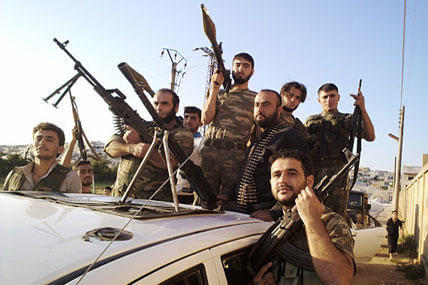Top Pentagon leaders said Tuesday that Iran is expanding its military support for the Syrian regime to include organizing and training pro-government, paramilitary formations to reinforce the country’s battle-weary army.
“It is obvious … that Iran is playing a larger role in Syria,” said Defense Secretary Leon Panetta, who was joined by Chairman of the Joint Chiefs of Staff Gen. Martin Dempsey at a Pentagon meeting with reporters. “They are trying to train a militia in Syria. We do not think Iran ought to be playing that role.”
There has been no slowdown in the fierce street fighting between Syrian troops and rebel forces since the uprising against President Bashar al-Assad began in March 2011.
Earlier in the year, Iran appeared to support an end to the conflict when Tehran formally backed a six-point United Nations plan in March.
But in late July, Iran’s First Vice President Mohammad Reza Rahimi pledged its allegiance to the Syrian regime.
"Given that powers have united to damage the Syrian nation, Iran's stance toward Syria is not changeable -- it will always stand by its Syrian brothers,” Rahimi said, according to a report by the United States Institute for Peace
Iran appears to be doing just that, now that Syria’s military is beginning to show signs of battle fatigue, Pentagon officials said.
“The Syrian army has been fighting for 18 months; any army would be taxed by that pace,” Dempsey said. “They have resupply problems and morale problems. I actually think that is why Iran is stepping in to form militias to take pressure off the Syrian military.”
Iran is trying to recruit and train Shia Muslims in Syria the same way it did in Iraq, Dempsey said.
Pentagon officials are not recommending U.S. military intervention but instead stressed the importance of a strong diplomatic effort in Syria. Panetta said the U.S. is currently focused on providing humanitarian assistance, monitoring the security of Syria’s chemical and biological weapons sites and assisting opposition forces.
Panetta, however, stressed that there is enough U.S. combat power in the region if a military solution becomes necessary.
“There is no question in my mind that we have positioned a sufficient force in the Middle East to deal with any contingency, and we are prepared to respond to whatever the president of the United States asks us to do,” he said.
There has been talk in the international community and within Congress of creating a no-fly zone, but Panetta said that was not “a front-burner issue.”
“Our hope is that Iran thinks better of how much they do want to get involved, but in any event, we have got to make sure that Iran does not exercise that kind of influence in Syria,” Panetta said.





























